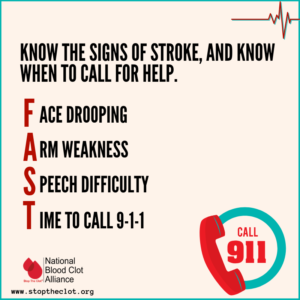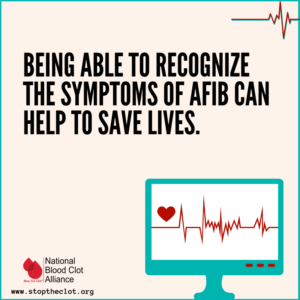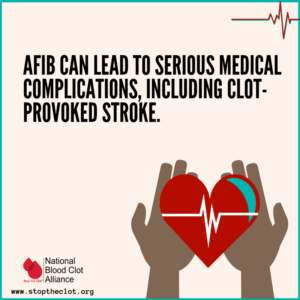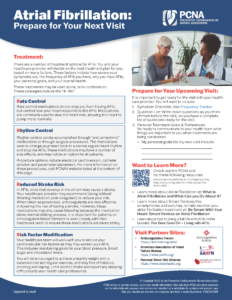Atrial Fibrillation (AFib) and Clot-Provoked Stroke
Atrial fibrillation is the most common type of irregular heartbeat.
When the heart is working normally, electrical signals sent to the heart cause blood to pump in a regular pattern. When you have atrial fibrillation, also known as AFib or AF, the normal rhythm of your heart becomes irregular, due to disorganized electrical signals. This causes the upper chambers of your heart, called the atria, to beat chaotically. This restricts blood from being efficiently pumped from your heart. When your heart can’t pump out blood effectively, the blood can sometimes pool in your heart and form a blood clot.
AFib can lead to serious medical complications, including clot-provoked stroke.
In the following video, David Garcia, MD, Professor of Medicine in the Division of Hematology at the University of Washington, and a member of the Medical & Scientific Advisory Board of NBCA, discusses atrial fibrillation.
Who does atrial fibrillation affect?
More than 2.6 million Americans are affected by AFib, and that number is expected to increase to about 12 million by the year 2050, due to the aging of our population.
Some risk factors for AFib include:
- People older than 40 years have a 1 in 4 risk of developing AFib in their lifetime
- Obesity is associated with changes in the heart that are known predictors of AFib
- Changes to the heart caused by hypertension can lead to AFib
 AFib and Stroke
AFib and Stroke
By itself, AFib is generally not a life-threatening condition, but it can lead to serious medical complications.
- Nearly 350,000 hospitalizations every year are attributed to AFib
- AFib can contribute to congestive heart failure and other serious heart conditions
- Perhaps the most serious complication of AFib is stroke
- Nearly one in every six strokes is caused by AFib
- In fact, AFib patients are nearly five times more likely to suffer a stroke than those without the condition
- AFib-related strokes are nearly twice as fatal and twice as disabling as non-AFib-related strokes
A stroke occurs when the flow of blood to part of the brain is significantly reduced or blocked. Often, this results in the death of brain cells, which can lead to permanent damage or even death. The most common cause of stroke is a blood clot. AFib puts patients at an increased risk for stroke because blood may not be properly pumped out of the heart, which may cause it to pool and form a clot. This clot can then travel to the brain and block the flow of blood to part of the brain which can result in a stroke.
Reducing Your Stroke Risk
When it comes to treating AFib there are two primary treatment goals: 1) Reducing the risk of blood clots and stroke and 2) Managing abnormal heart rate or rhythm.
As a result, patients may need one or more medications to treat their AFib. Reducing stroke risk is an important part of treating AFib. To help reduce the risk of AFib-related stroke, healthcare providers may prescribe anticoagulants or antiplatelets, which are both blood thinners to help prevent blood clots from forming. There are different kinds of blood thinners. Older blood thinners require regular blood tests to monitor how the blood thinners are working. Newer blood thinners do not. Patients should check with their physician to see which kind of blood thinners are best for them.
Read more about anticoagulant and antiplatelet therapies here: American Heart Association, Clot, Not!
Abnormal heartbeats, another concern in treating AFib, may be treated with medications that affect the heart’s rate (pacing) or rhythm (coordination), or a surgical procedure such as electrical cardioversion, catheter ablation or surgical intervention.
It’s important for patients to talk with their healthcare providers about available AFib treatment options, including the new oral blood thinners, also called anticoagulants. Working together, only patients and their healthcare providers can determine the treatment plan that’s right for them.
Symptoms of AFib
AFib affects patients differently. Some patients report feeling symptoms while others may not experience any symptoms at all. People with AFib may still be at risk for stroke, even if they have no symptoms.
Common symptoms of AFib may include:
- Heart palpitations or racing heartbeat
- Fluttering in the chest
- Dizziness
- Shortness of breath
- Chest pain
- Weakness
- Faintness and fatigue
- Sweating
If you’re at risk for AFib or have AFib, talk about it – with your family, your friends and your healthcare team. If you have AFib, make sure to ask your healthcare provider if you’re doing all you can to help reduce your risk of AFib-related stroke. Only you and your healthcare provider can determine a treatment plan that is best for you.
Additional Resources & Support
Atrial Fibrillation (AFib) Resources
Atrial Fibrillation Discussion Guide
Atrial Fibrillation Frequency Tracker
- 2019 Guidelines for the Management of Patients With Atrial Fibrillation
- StopAfib.org
- Read about NBCA’s AFib Awareness Survey





